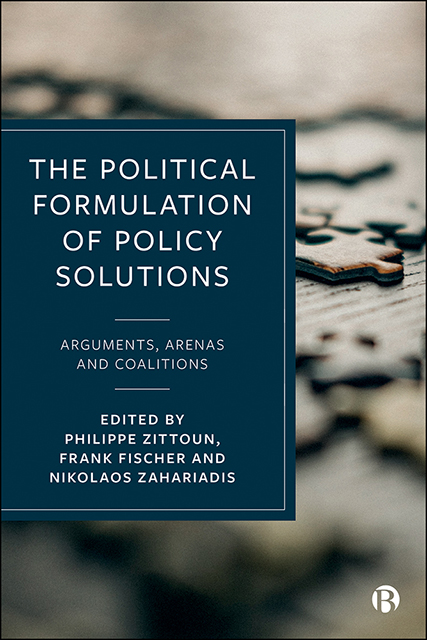Book contents
- Frontmatter
- Contents
- Notes on Contributors
- 1 Introduction – Policy Formulation: A Political Perspective
- 2 Upcycling a Trashed Policy Solution? Argumentative Couplings for Solution Definition and Deconstruction in German Pension Policy
- 3 Binding and Unbinding Problem– Solution Associations in US Agricultural Policy Making: The Introduction and Demise of Direct Payments to Farmers
- 4 The Role of Expert Reporting in Binding Together Policy Problem and Solution Definition Processes
- 5 Coalitions and Values in the Flow of Policy Solutions
- 6 The Marks of Ownership: The Promotion of Carbon Capture and Storage in France
- 7 Anticipating Public Approval in the Binding of Immigrant Integration Problems and Solutions
- 8 Discourse Coalitions and the Messiness of Policy Solutions: College Governance in Nevada
- 9 Policy Solution Ownership: Road-Space Re-Allocation as a New Approach to Urban Mobility
- Index
1 - Introduction – Policy Formulation: A Political Perspective
Published online by Cambridge University Press: 21 April 2023
- Frontmatter
- Contents
- Notes on Contributors
- 1 Introduction – Policy Formulation: A Political Perspective
- 2 Upcycling a Trashed Policy Solution? Argumentative Couplings for Solution Definition and Deconstruction in German Pension Policy
- 3 Binding and Unbinding Problem– Solution Associations in US Agricultural Policy Making: The Introduction and Demise of Direct Payments to Farmers
- 4 The Role of Expert Reporting in Binding Together Policy Problem and Solution Definition Processes
- 5 Coalitions and Values in the Flow of Policy Solutions
- 6 The Marks of Ownership: The Promotion of Carbon Capture and Storage in France
- 7 Anticipating Public Approval in the Binding of Immigrant Integration Problems and Solutions
- 8 Discourse Coalitions and the Messiness of Policy Solutions: College Governance in Nevada
- 9 Policy Solution Ownership: Road-Space Re-Allocation as a New Approach to Urban Mobility
- Index
Summary
In the 1960s and 1970s, controversies related to the policy process began to emerge, in particular as they pertained to the policy decision-making process. Criticizing both pluralist theory and behaviouralist approaches, Schattschneider (1960), later followed by Cobb and Elder (1971, p 896) and Bachrach and Baratz (1970, p 44), suggested that the pre-decision process is a ‘highly restricted’ arena of conflicts in which some demands can be ‘suffocated’ or reinterpreted through the ‘manipulation of bias’ to prevent their emergence in decision arenas. This strategy was used to reduce the capacity of particular demands to attract the attention of decision makers and others, including the media and the general public. The authors insisted on recognizing the importance of the unequal political configurations of actors in the arena. Building on this perspective, Rochefort and Cobb (1994) published The Politics of Problem Definition, which helped to establish a link between definitional activities focused on problems and their asymmetric positions in relation to political power.
While this political perspective on the struggles surrounding problem definitions has been largely shared in policy studies by most authors and integrated into textbooks and handbooks about the policy process since the 1970s, the question of ‘policy formulation’ – referring to the specification of alternatives – has been studied using different approaches, including competing methodological perspectives, with no general consensus emerging. In so far as problem definition occurs within arenas of visible conflict in which dominant actors try to suppress opposing views, the formulation of solutions takes place in relatively hidden spaces where groups of dominant actors seek to contribute to the stability (or change) of the policy-making process by choosing and imposing their preferred solutions (Heclo and Wildavsky 1974; Richardson and Jordan 1979). As Kingdon (1984) observed, the contested and conflictual dynamic of problem definition contrasts with the incrementalist mode of policy formulation.
Focusing on the stability of policy solution formulation, Kingdon's perspective plays an important role in explaining policy change resulting from external factors that can disturb a punctuated equilibrium (Baumgartner and Jones 1993). Political conflict often appears outside the policy formulation process. Why, then, does the policy formulation stage appear as apolitical and non-conflictual in numerous studies?
- Type
- Chapter
- Information
- The Political Formulation of Policy SolutionsArguments, Arenas, and Coalitions, pp. 1 - 20Publisher: Bristol University PressPrint publication year: 2021



